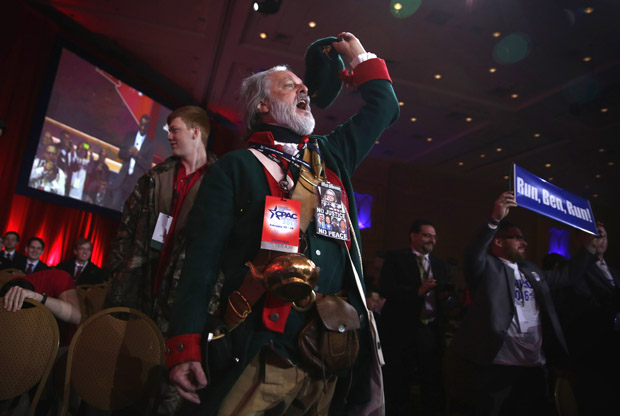Diane’s farewell message
After 52 years at WAMU, Diane Rehm says goodbye.

William Temple of the Golden Isles Tea Party in Georgia, dressed as Button Gwinnett, the second signer on the United States Declaration of Independence, cheers as Ben Carson speaks Feb. 26 during the 42nd annual Conservative Political Action Conference (CPAC) in National Harbor, Maryland.
The clock is ticking as Congress races to fund the Department of Homeland Security. The House of Representatives considers a short-term funding bill to buy time before tonight’s midnight deadline. President Barack Obama vetoes the Keystone XL Pipeline bill, the first of many vetoes expected in his last two years in office. Jeb Bush hopes to change some minds at the Conservative Political Action Conference. Hillary Clinton lays out possible 2016 campaign themes in a speech to 5,000 women in Silicon Valley. And in an historic vote, the Federal Communications Commission classifies broadband internet service as a public utility. A panel of journalists joins Diane for analysis of the week’s top national news stories.
Most experts are putting Hillary Clinton as the democratic front runner for the 2016 presidential elections.
But some say she would actually benefit from some competition in the primary, and that some of her positions will likely be shaped by Sen. Elizabeth Warren (D-Mass.), a favorite among more progressive Democrats who has said she won’t run but has met with Clinton about her campaign.
After 52 years at WAMU, Diane Rehm says goodbye.
Diane takes the mic one last time at WAMU. She talks to Susan Page of USA Today about Trump’s first hundred days – and what they say about the next hundred.
Maryland Congressman Jamie Raskin was first elected to the House in 2016, just as Donald Trump ascended to the presidency for the first time. Since then, few Democrats have worked as…
Can the courts act as a check on the Trump administration’s power? CNN chief Supreme Court analyst Joan Biskupic on how the clash over deportations is testing the judiciary.